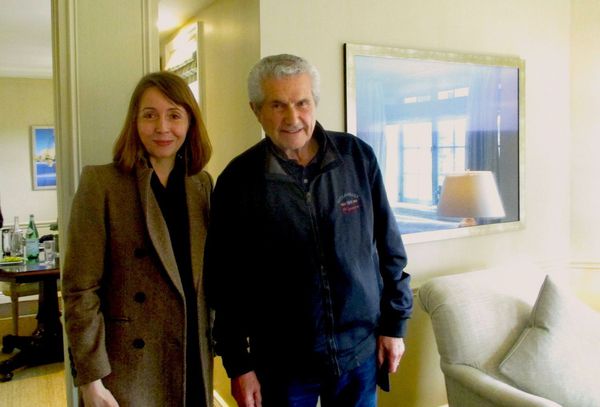 |
| Claude Lelouch with Anne-Katrin Titze on Quentin Tarantino and Le Voyou: "He told me if he hadn't seen that film he wouldn't have made Pulp Fiction." Photo: Sylvie Sergent |
On the afternoon of the Focus on French Cinema screenings at the French Institute Alliance Française in New York of Un + Une (One Plus One) with Jean Dujardin, Elsa Zylberstein, Christophe Lambert and Alice Pol, and Un Homme Et Une Femme (A Man And A Woman), starring Anouk Aimée and Jean-Louis Trintignant, I met with the director/screenwriter Claude Lelouch at his hotel.
Disguises in La Bonne Année (Happy New Year) with Lino Ventura and Charles Gérard, kidnapping in Le Voyou (The Crook) with Trintignant and Christine Lelouch, traveling with Fanny Ardant, Dominique Pinon, and Audrey Dana in Roman De Gare (Crossed Tracks), influencing Terrence Malick, Abbas Kiarostami and cars, Howard Hawks's Bringing Up Baby, Tarantino's Pulp Fiction, dogs versus cats, and a surprise for Anouk Aimée - were all unmasked in our conversation.
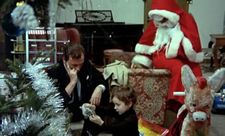 |
| Simon (Jean‑Louis Trintignant) with Daniel (Vincent Rozière) in Le Voyou: 'I wanted the kidnapping scene to be a very tender scene' |
In 1966, Un Homme Et Une Femme won the Cannes Palme d'Or (tied with Pietro Germi's The Birds, The Bees And The Italians), and in 1967 won the Best Foreign Language Film Oscar, and Claude Lelouch with Pierre Uytterhoeven took Best Writing, Story and Screenplay honors. Anouk Aimée took home a Best Foreign Actress BAFTA.
Anne-Katrin Titze: Looking at your films, I get the impression that you have very little fear of failure. The way you assemble the plot, many different things, that other filmmakers would be far too afraid to do. That courage - it's more of a comment than a question.
Claude Lelouch: No, you're absolutely right. After the success of Un Homme Et Une Femme I had every offer on earth. The greatest actors, the greatest screenwriters all wanted to work with me. And I turned them all down because cinema for me is a centre of experimentation on the study of the human race. We can only experiment when we take risks.
The greatest scientists and researchers were always taking risks. I never played the easy card. For me, the human race is the latest invention of the great creator and it's a great invention but it hadn't quite been perfected. And on my humble level I like to participate in perfecting it. That's why in my films I experiment with all the different feelings possible.
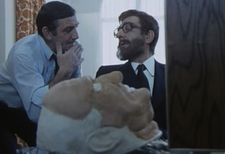 |
| Simon (Lino Ventura) with Charlot (Charles Gérard) in La Bonne Année: 'Well, if you like actors, you like disguises' |
AKT: Please explain a bit further the experiment!
CL: Earth, in my eyes, is a lab. We're all mice and rats on which all these different things are being tried out. Jealousy, languages, borders, lies, truth. Once the human race is perfected, I think we'll be able to be exported to the universe. But for the time being we have the universe, it belongs to us, but we can't export ourselves to it. I feel that we have to perfect ourselves before we can do that.
And I like all those who have tried to understand humans to try to perfect them. So I use my films to show my observations. I'm nothing more than a reporter. All I do is observe. But through those observations I try to participate in this perfecting of the human race. I try to share that with the largest number of people and when the films are not successful, with the smallest number of people. I don't judge at all. I just try to be a well-meaning observer.
AKT: During your childhood, you spent a lot of time in cinemas [his mother hid him there during the Nazi occupation of Paris]. With a heavy burden of being forced to be a spectator. Do you remember some of the films you were watching then?
CL: Those remain my most beautiful memories. Because I went to the movies at an age where you don't go to the movies, cinema brought me into the world. It was really like a second birth for me. So with all my childlike naiveté I was watching these movies, I thought that the people that were on screen were the same as the people in life, except they were successful. They were more beautiful, more courageous, more intelligent and so very quickly I realised that these were the people I want to hang out with.
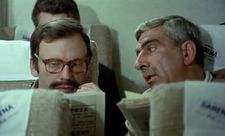 |
| Simon (Jean‑Louis Trintignant) in disguise with Charlot (Charles Gérard) in Le Voyou |
These are the people I want to spend my life with. And I understood that dreams, entertainment and recess were what I liked best in life. No child would go to school if there were no recess. So I want my films to be like recess, like the playground. And then after we have our fun, we can see, whether we can take ourselves seriously or not.
AKT: I almost brought a fake mustache today but I couldn't find one yesterday. I thought about showing up at the hotel with a mustache and glasses. [This is in reference to a scene from La Bonne Année where Lino Ventura's character (Simon) gifts his friend (Charles Gérard as Charlot) with a set of disguises]. Now I regret I didn't. Do you like disguises?
CL: Well, if you like actors, you like disguises. And I especially love people who have a sense of humor. Who try to break the difficulty of daily life. You can laugh about anything as long as it's funny. So every time I can, I try to amuse spectators. And I would also one day like to do an interview in disguise, maybe wearing a mustache or maybe women's clothing to see what that would be like.
AKT: Next time, we'll do that! When I thought about meeting you, I was trying to think of one scene that for me encompasses the spirit of your work the most. And it was the kidnapping of the boy (Vincent Rozière as Daniel Gallois) in Le Voyou.
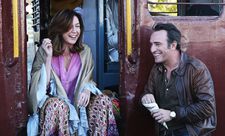 |
| Elsa Zylberstein is Anna and Jean Dujardin is Antoine in Un + Une |
It's a lovely sequence - he gets a cocker spaniel puppy, they play with him, the boy has a smile on his face the whole time. I would like to start with that scene. Do you have any memories of developing this beautiful kidnapping?
CL: It's a very old film. I have to call on my memory. It's a film I have a marvelous memory of. This film nearly became a true story. What happened was that these thugs, these criminals, came to tell me about a heist they wanted to carry out. I said to them - look, if you do this heist you're going to go to jail. It's much better if we make a film of it. And that's how I came to adapt a real potential heist into a movie.
AKT: Perfect story.
CL: I wanted the kidnapping scene to be a very tender scene. I wanted these thugs to leave the boy with a good memory and not a bad memory.
AKT: It's the most perfect kidnapping that I know of in cinema. [The parents of the little boy are tricked into handing over their child to the kidnappers because they are made to believe their phone number had been randomly chosen and they won a new car, a Simca] The first car I was ever in was a Simca. My father picked up my mother and me - after I was born - from the hospital in one. So "Merci, Simca!".
_225.jpg) |
| Jean-Louis Trintignant as Jean-Louis and Anouk Aimée is Anne in A Man And A Woman |
CL: I know it's one of Tarantino's favourite films. He told me if he hadn't seen that film he wouldn't have made Pulp Fiction.
AKT: That makes so much sense.
CL: I'm delighted we brought up the memory of this film.
Coming up - Claude Lelouch on travelling in Roman De Gare, La Bonne Année and Bringing Up Baby, dogs versus cats, Abbas Kiarostami and cars, a surprise for Anouk Aimée in Un Homme Et Une Femme, Terrence Malick, filming in chronological order, and "my ends are not ends."
Three additional highlights of this year's Focus on French Cinema all screen on Saturday, April 1:
- Bertrand Tavernier's living, breathing adventure ride Voyage à Travers Le Cinéma Français.
- Katell Quillévéré's medical thriller Réparer Les Vivants.
- Jérôme Salle's seductive L'Odyssée which belongs to Lambert Wilson and the deep blue sea.
Focus on French Cinema runs through April 2.





















